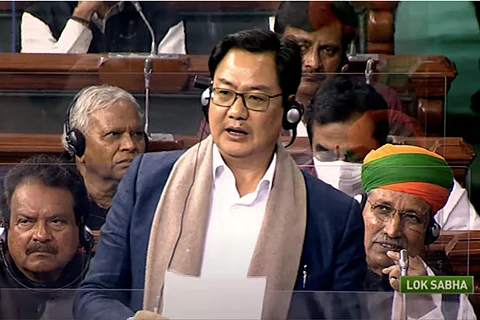

The Election Laws (Amendment) Bill, 2021, which seeks to link electoral rolls with the Aadhaar ecosystem to weed out duplication, was introduced in Lok Sabha on Monday, December 20. Introducing the Bill, Union Law Minister Kiren Rijiju said the legislation will end bogus voting in the country and make the electoral process more credible. Rajendra Agarwal, who was in the chair, accepted the introduction of the Bill after taking voice votes.
However, opposition parties, led by Congress, opposed the Bill, saying it will infringe the fundamental rights of citizens. The main contention was to allow the linking of voter IDs with Aadhaar cards. Congress MPs Manish Tewari and Adhir Ranjan Choudhury strongly opposed the Bill, stating that the Bill will violate the Supreme Court judgement on Aadhaar. “We are forgetting that Aaadhaar was only meant to be a proof of residence and not a proof of citizenship,” Congress MP from Thiruvananthapuram Shashi Tharoor said. BSP MP Ritesh Pandey said that the Bill violates principles of proportionality given under the Puttaswamy judgment which had said that the right to privacy is guaranteed as a fundamental right. AIMIM MP from Hyderabad Asaduddin Owaisi alleged that the Bill will allow the government to ‘profile and disenfranchise’ voters and demanded a division vote.
Union Law Minister Kiren Rijiju defended the Bill, saying that the government aims to weed out bogus voters through this Bill, and that it does not violate the rights of the citizens. He added that linking Aadhaar number with voter ID is a step that is in the interest of the state. The Bill was then introduced in the Lok Sabha with a voice vote.
As opposition protests over various issues, including on the Lakhimpur Kheri incident, continued, Agarwal adjourned the House till 2 pm. Earlier, when the House met after the weekend break at 11 am, opposition members stormed into the Well and began protesting. Lok Sabha Speaker Om Birla urged members to maintain decorum and go back to their seats. As the members refused to relent, the Speaker adjourned the House till noon after taking up a few questions.
The Election Laws (Amendment) Bill, 2021 seeks to allow electoral registration officers to seek Aadhaar number of people who want to register as voters "for the purpose of establishing the identity".
It also seeks to allow the electoral registration officers to ask for Aadhaar numbers from "persons already included in the electoral roll for the purposes of authentication of entries in the electoral roll, and to identify registration of the name of the same person in the electoral roll of more than one constituency or more than once in the same constituency."
At the same time, the amendment Bill makes it clear that "no application for inclusion of name in the electoral roll shall be denied and no entries in the electoral roll shall be deleted for the inability of an individual to furnish or intimate Aadhaar number due to such sufficient cause as may be prescribed." Such people will be allowed to furnish other alternative documents as may be prescribed.
According to the Bill circulated to Lok Sabha members ahead of its introduction, various sections of the Representation of the People Act, 1950 and 1951 will be amended. The Statement of Objects and Reasons of the Bill states that Section 23 of the RP Act, 1950 will be amended to allow linking of electoral roll data with the Aadhaar ecosystem "to curb the menace of multiple enrolments of the same person in different places."
Amendment to section 14 of the RP Act, 1950 will allow four "qualifying" dates for eligible people to register as voters. As of now, January 1 of every year is the sole qualifying date. People who turn 18 on or before January 1 can register as voters. Those turning 18 after that have to wait for one whole year to register as voters.
Now, "the 1st day of January, 1st day of April, 1st day of July and 1st day of October in a calendar year" will be the qualifying dates in relation to the preparation or revision of electoral rolls.
Amendment to section 20 of the RP Act, 1950 and section 60 of the RP Act, 1951 will allow the elections to become gender-neutral for service voters. The amendment will also help replace the word "wife" with the word "spouse" making the statutes "gender-neutral." An Armyman's wife is entitled to be enrolled as a service voter, but a woman Army officer's husband is not, according to provisions in the electoral law. With "wife" being replaced by the term "spouse," this will change.
With PTI inputs